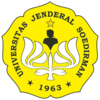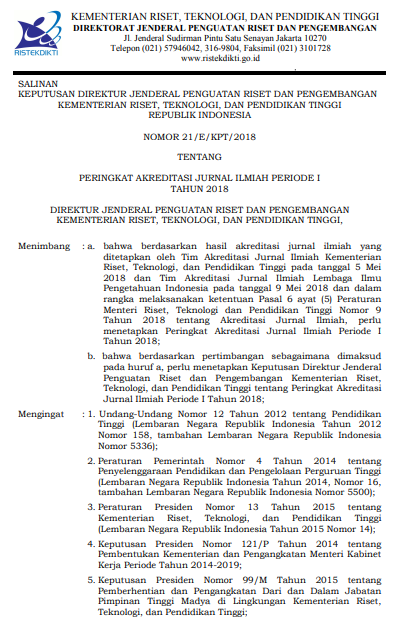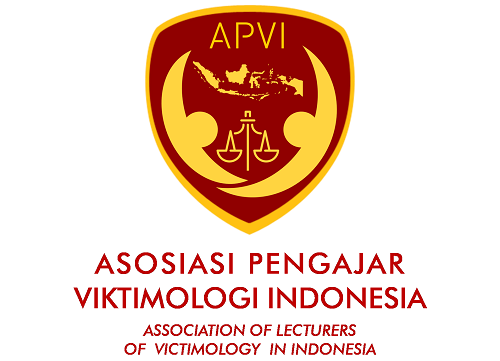The Indonesia Government's Strategy in Arrest and Confiscation of Criminal Corruption (Corruptor) Assets Abroad
Abstract
Eradication efforts of corrupting in Indonesia have been carried out, but until now there are still many corruption cases that have not been resolved in various ways by the perpetrators or corruptors. Corruptors often drain the funds from the results of corrupting, even the corruptors then go or run abroad. This raises problems in the process of law enforcement and recovery of financial and economic losses in the country, namely the mechanism for returning assets resulting from criminal acts of corrupting abroad. Therefore, the objectives of this study are to (1) Explain how is Indonesia Government's strategy in arrest and confiscation of criminal corruption (corruptor) assets abroad. (2) Explain how is international treaties concerning the seizure of assets resulting from criminal acts of corrupting are abroad. The research method used in this research is qualitative with a juridical legal approach normative. The results showed that the cooperation between countries is the best strategy that can be done by the Indonesia government in overcoming problems of sovereignty. Some examples of these forms of international cooperation are extradition treaties (extradition), Mutual legal assistance in criminal matters (MLA). The mechanism for the return of assets in MLA consists of four stages of the asset return process (Article 46 Chapter IV, UNCAC).
Keywords: international cooperation; eradication of corruption; confiscation of assets; extradition; mutual legal assistance in criminal matters.
Full Text:
PDF View
References
Ali, M. (2013). Teori dan Praktik Hukum Pidana Korupsi. Yogyakarta: UII Press.
Anti-corruption Learning Centre (ACLC). (2021). Kerugian Negara Akibat Korupsi di Indonesia, can be accessed online at https://aclc.kpk.go.id/materi/bahaya-dan-dam- pak-korupsi/infografis/kerugian-negara-akibat-korupsi-di-indonesia
Cyrer, R. & Friman, H. et all, (2010). An Introduction to International Criminal Law and Procedure. UK: Cambridge University Press.
Darwis, N. (2014). Efektifitas Penerapan Undang-Undang Ekstradisi Terhadap Pelaku Kejahatan “Trans Nasional Crime”. Jurnal Ilmiah Hukum Dirgantara. 8 (2). 1-16. Firdaus. (2017). Perjanjian Bantuan Timbal Balik Dalam Masalah Pidana Antara Republik Indonesia dan Republik Islam Iran. Jurnal Penelitian Hukum De Jure. 17(4). 351-371.
Ginting, J. (2011). Perjanjian Internasional Dalam Pengembalian Aset Hasil Korupsi Di Indonesia. Jurnal Dinamika Hukum. 11(3). 450-459.
Gunawan Y. & Wilanti, R. (2015). The Urgency of Rome Statute of the International Criminal Court Ratification for Republic of Indonesia. US-China L. Rev. 12(1). 22-41. Harrington, J. (2018). The Role For Human Rights Obligations In Canadian Extradition Law. Canada: Canadian Yearbook of International Law No 43, University of Alberta.
Harris, J. E. International Cooperation in Fighting Transnational Organized Crime: 114th International Special Emphasis on Mutual Legal Assistance and Extradition, Director, Office of International Affairs, Criminal Division, US Department of Justice, United States of America: Training Course Visiting Experts Papers, Resource Material Series No. 5.
Hartono, B. & Hapsari, R.A. (2019). Mutual Legal Assistance Pada Pemberantasan Cyber Crime Lintas Yurisdiksi di Indonesia. SASI. 25 (1). 59-71.
Indriati, N. (2009). Mutual Legal Assistance Treaties (MLATs) Sebagai Instrumen Pemberantasan Kejahatan Internasional. Jurnal Dinamika Hukum. 9(2). 104-110. Integrito. (2018). Corruption Eradication Commission (KPK) Magazine, Edition IV, Cross-Country Agrees to Fight Corruption, can be accessed online at www.kpk.go.id or https://acch.kpk.go.id/id/integrito-majalah
Kalalo, F.P. (2016). Efektifitas Perjanjian Ekstradisi sebagai Sarana Pencegahan, Pemberantasan dan Penghukuman Pelaku Tindak Pidana Internasional. Lex et Societatis. 5(1). 5-12.
Kholis, E. L. (2010). Pembayaran Uang Pengganti Dalam Perkara Korupsi. Jakarta: Solusi Publishing.
Kimberly Prost (2021). Breaking Down the Barriers: International Cooperation in Combating Transnational Crime. the emispheric Network for Legal Cooperation on Criminal Matters of the Meetings of Ministers of Justice or of Other Ministers or Attorneys General of the Americas (REMJA) can be accessed online at http://www. oas.org/juridico/mla/en/can/en_can_prost.en.html
Kusuma, S.E. (2010). The relationship Between Money Laundering and banking. Jurnal Keuangan dan Perbankan. 11(1).
Latifah, M. (2016). Penunjukan Otoritas Pusat Dalam Bantuan Timbal Balik Pidana di Indonesia. Negara Hukum. Jurnal DPR RI. 7(1). 53-69.
Marsono. (2017). Pemberantasan Korupsi di Indonesia: Dari Perspektif Penegakan Hukum. Manajemen Pembangunan. 16(58). 57-62.
Mega Jaya, A. (2017). Implementasi Perampasan Harta Kekayaan Pelaku Tindak PidanaKorupsi. Cepalo. 1(3). 19-28.
Mega Jaya, B. P. (2020). Transnational Criminal Case Settlement Through International Cooperation (A Case Study of Harun Masiku). Ajudikasi: Jurnal Ilmu Hukum. 4(1), 69. 82.
Melani. (2005). Problematik Prinsip Double Criminality Dalam Hubungannya dengan Kerjasama Pencegahan dan Pemberantasan Kejahatan transnasional. Jurnal Ilmu Hukum Litigasi. 6(2).
Nurmalawaty. (2006). Faktor Penyebab terjadinya Tindak Pidana Pencucian uang (Money Laundering) dan Upaya Pencegahannya. Jurnal Equality. 11(1). 12-18.
Online News. Detik.Com. (2019). ICW data for 40 fugitive snapper yet Arrested from BLBI to Century, can be accessed online at https://news.detik.com/berita/d4433645/data- icw-40-fugitive-snapper-not-yet-arrested-from-blbi-hinggacentury
Online News. Kompas.com. (2021). ICW “Sebut Kerugian Negara Akibat Tindak Pidana Korupsi Meningkat 4 Kali Lipat”, can be accessed online at https://nasional. kompas.com/read/2021/03/22/17391501/icw-sebut-kerugian-negara-akibat-korupsi-di-tahun-2020-meningkat-4-kali?page=all
Parthiana, I. W. (2006). Hukum Pidana Internasional. Bandung: CV. Yrama Widya.
Samekto, FX. Adji. (2009). Negara dalam Dimensi Hukum Internasional. Bandung: PT. Citra Aditya Bakti.
Setiadi, E (2016). Perjanjian Ekstradisi Antara Indonesia dan Vietnam. International & Diplomacy. 2(1). 83-94.
Setiadi, W. (2018). Korupsi di Indonesia (Penyebab, Bahaya, Hambatan dan Upaya Pemberantasan, Serta Regulasi). Jurnal Legislasi Indonesia. 15(3). 249-262.
Setiawan. B. (2004). United Nations Convention Against Transnational Organized Crime. Indonesian Journal of International Law. 1(4). 813-842.
Siregar, M.F. (2015). Prinsip-Prinsip Hukum Pidana & HAM Perkapolri No 8 Tahun 2009 & Penegakan Hukum Pidanan Berbasis HAM di Indonesia. Jurnal Pushan Unimed. 6(1). 185-200.
Suarda, I. G. W (2012). Hukum Pidana Internasional. Bandung: PT Citra Aditya Bakti. Sunaryanto, A. et.al. (2012). Modul Monitoring Penegakan Hukum Jakarta: Indonesia Corruption Watch.
Syarifuddin, (2016). Relevansi Undang-Undang No. 1 Tahun 1979 tentang Ekstradisi Dengan Perkembangan Hukum Ekstradisi Internasional (Studi Kasus: Perjanjian Ekstradisi Indonesia-Singapura). Jurnal Komunikasi Hukum. 2(1). 94-113.
United Nations Office Drugs and Crimes, Signature and Ratification Status, can be accessed online at https://www.unodc.org/unodc/en/corruption/ratification-status. html.
Waryenti, D. (2012). Ekstradisi dan Beberapa Permasalahannya. Fiat Justitia. 5(2). 1-18.
DOI: http://dx.doi.org/10.20884/1.jdh.2021.21.3.2882
Refbacks
- There are currently no refbacks.
JURNAL DINAMIKA HUKUM Indexed by :
 | Jurnal Dinamika Hukum | |
| Faculty of Law, Universitas Jenderal Soedirman | Copyright of Jurnal Dinamika Hukum | |
| Yustisia IV Building, Law Journal Center | ISSN 2407-6562 (Online) ISSN 1410-0797 (Print) | |
| Purwokerto, Central Java, Indonesia, 53122 | JDH is licensed under a Creative Commons Attribution 4.0 International License | |






